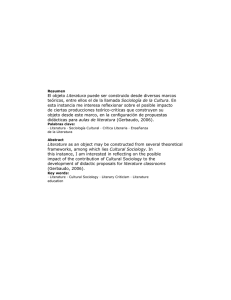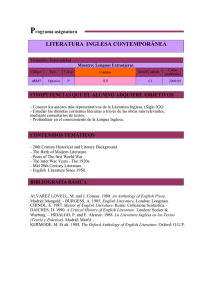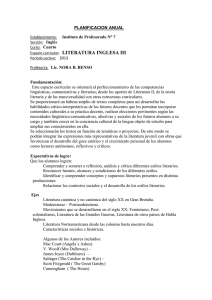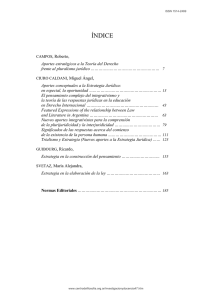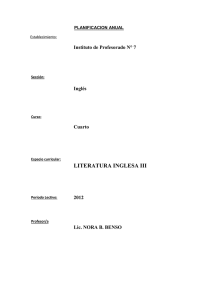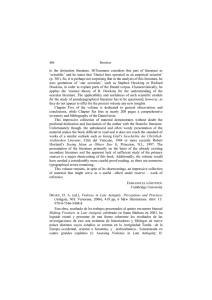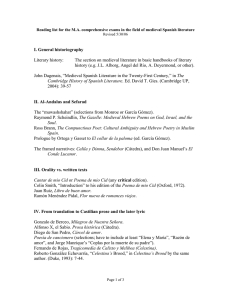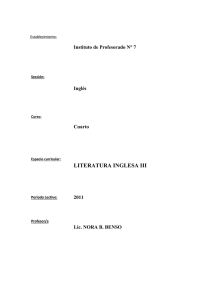Classical Literature and its Impact on European Literature
Anuncio
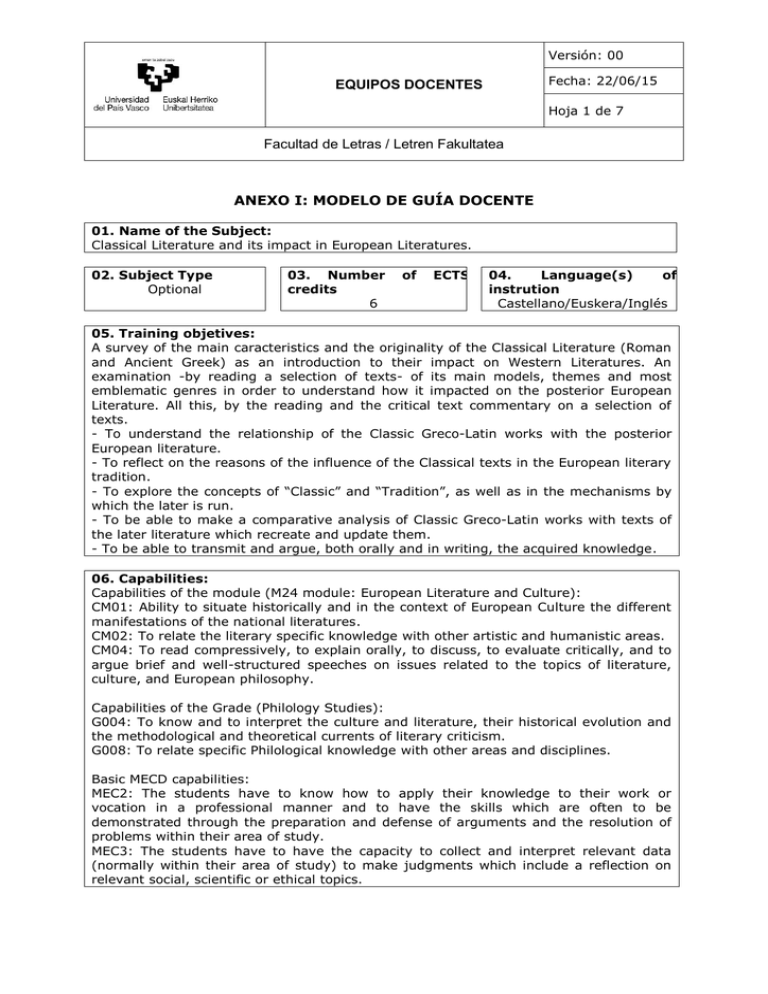
Versión: 00 Fecha: 22/06/15 EEQUIPOS DOCENTES Hoja 1 de 7 Facultad de Letras / Letren Fakultatea ANEXO I: MODELO DE GUÍA DOCENTE 01. Name of the Subject: Classical Literature and its impact in European Literatures. 02. Subject Type Optional 03. Number credits 6 of ECTS 04. Language(s) of instrution Castellano/Euskera/Inglés 05. Training objetives: A survey of the main caracteristics and the originality of the Classical Literature (Roman and Ancient Greek) as an introduction to their impact on Western Literatures. An examination -by reading a selection of texts- of its main models, themes and most emblematic genres in order to understand how it impacted on the posterior European Literature. All this, by the reading and the critical text commentary on a selection of texts. - To understand the relationship of the Classic Greco-Latin works with the posterior European literature. - To reflect on the reasons of the influence of the Classical texts in the European literary tradition. - To explore the concepts of “Classic” and “Tradition”, as well as in the mechanisms by which the later is run. - To be able to make a comparative analysis of Classic Greco-Latin works with texts of the later literature which recreate and update them. - To be able to transmit and argue, both orally and in writing, the acquired knowledge. 06. Capabilities: Capabilities of the module (M24 module: European Literature and Culture): CM01: Ability to situate historically and in the context of European Culture the different manifestations of the national literatures. CM02: To relate the literary specific knowledge with other artistic and humanistic areas. CM04: To read compressively, to explain orally, to discuss, to evaluate critically, and to argue brief and well-structured speeches on issues related to the topics of literature, culture, and European philosophy. Capabilities of the Grade (Philology Studies): G004: To know and to interpret the culture and literature, their historical evolution and the methodological and theoretical currents of literary criticism. G008: To relate specific Philological knowledge with other areas and disciplines. Basic MECD capabilities: MEC2: The students have to know how to apply their knowledge to their work or vocation in a professional manner and to have the skills which are often to be demonstrated through the preparation and defense of arguments and the resolution of problems within their area of study. MEC3: The students have to have the capacity to collect and interpret relevant data (normally within their area of study) to make judgments which include a reflection on relevant social, scientific or ethical topics. Versión: 00 Fecha: 22/06/15 EEQUIPOS DOCENTES Hoja 2 de 7 Facultad de Letras / Letren Fakultatea 07. Contents: 1. General definitions and concepts: What is a Classic Work?, the definition of Literary Tradition, the Reception of the Ancient Greek and Roman cultures. 2. Main characteristics of the Ancient Greek and Roman literatures, and the causes of their later impact. 3. Representative genres and authors, and their impact on the posterior European Literature. 4. Reading and critical text commentary on a selection of ilustrative Ancient Greek Literary texts. 5. Reading and critical text commentary on a selection of ilustrative Roman Literary texts. 6. Reading and critical text commentary on a selection of ilustrative European Literary texts. 08. Teaching Modalities: Modality Classroom Hours Lectures Classroom practices Total 40 20 60 Personal Research 60 30 90 Total 100 50 150 09. Actividades de docencia-aprendizaje: - Explanation and reasoning of the theoretical contents of the programme. - Reading comprehension and comparative analysis of ancient Greek and Roman texts and of some from the posterior European literature which illustrate such contents. - Discussion and interrogation in order to stimulate reflection on the value of the GrecoLatin Classical Literature and its reception in the European Literature. - Individual reading of representative works of the Greco-Latin Literature and later works which recreate and update them. - Preparation of a brief guided essay and its oral presentation in the classroom with the support of audiovisual media. 10. Evaluation Process by competencies and criteria: Nº of competencies CM02, CM01, CM04, G004, G008, MEC2 Assigments Methods fo assessment Final written exam CM01, CM02, CM04, G004, G008, MEC2, MEC3 Paper CM04, G008, Oral Level of understanding and depth in the critical analysis of texts. Stylistic correction, reasoning and knowledge. Depth in the commentary, personal contribution, stylistic correction, reasoning and knowledge Fluency, speech % of the final mark 50% 20% 20% Versión: 00 Fecha: 22/06/15 EEQUIPOS DOCENTES Hoja 3 de 7 Facultad de Letras / Letren Fakultatea MEC2, MEC3 presentation CM04, G008 Attitudes and values construction, distribution of time, appropriate use of electronic resources Participation in the classroom, motivation, fulfillment of tasks 10% 11. Mandatory materials: - A Selection of Classic Greek and Latin works, and later works that the recreate them (to be specified at the beginning of the semester). - Information deposited in EGela. - Theoretical presentations in classroom. 12. Bibliography: 12.1. Basic bibliography -Gómez Espelosín, F.J., Los Griegos. Un legado universal, Madrid 2003. -Highet, G., La tradición clásica. Influencias griegas y romanas en la literatura occidental, I-II, México 1978 (1ª ed. ingl. 1949). -Jenkyns, R. (ed.), El legado de Roma. Una nueva valoración, Barcelona, Crítica, 1995. -Signes Codoñer, J. et alii (eds.), Antiquae lectiones. El legado clásico desde la Antigüedad hasta la Revolución Francesa, Madrid, Cátedra, 2005. 12.2. Further reading: -Bécares, V. et alii (eds.), La intertextualidad en las literaturas griega y latina, Madrid, Ediciones Universidad de Salamanca-Ediciones Clásicas, 2000. -Bloom, H., El canon occidental, Barcelona 1995 (1ª ed. ingl. 1994). -Curtius, E.R., Literatura europea y Edad Media latina, Madrid-México 1976. -García Jurado, F., Encuentros complejos entre la literatura latina y las modernas: una propuesta desde el comparatismo, Madrid, Asociación Española de Eslavistas, 1999. -Howatson, M.C.-I. Chilvers (eds.), The concise Oxford companion to classical literature, OUP 1993 (Portal Biblioteca UPV/EHU). -Kallendorf, C.W. (ed.), A Companion to the Classical Tradition, Oxford-Malden, MA, 2007. -Lida de Malkiel, M.R., La tradición clásica en España, Barcelona, Ariel, 1975. -De Romilly, J., ¿Por qué Grecia?, Madrid 1997. 12.3. Journals: IJCT - International Journal of Classical Tradition: http://www.bu.edu/ict/ijct/index.html Exemplaria Classica: http://www.exemplariaclassica.org. Cuadernos de Filología Clásica (Estudios Latinos): http://www.ucm.es/BUCM/revistasBUC/portal/modulos.php?name=Revistas2&id=CFCL 12.4. Websites http://lectoresaudaces.blogspot.com/ http://clasicas.usal.es/portal_recursos/ http://interclassica.um.es/ 13. Observaciones: Versión: 00 EEQUIPOS DOCENTES Fecha: 22/06/15 Hoja 4 de 7 Facultad de Letras / Letren Fakultatea The students unable to attend class regularly, in addition to justify it properly, have to get in contact with the teachers at the beginning of the course or when this situation occurs. Versión: 00 EEQUIPOS DOCENTES Fecha: 22/06/15 Hoja 5 de 7 Facultad de Letras / Letren Fakultatea DIRECTRICES PARA RELLENAR LOS DISTINTOS CAMPOS 01. Nombre de la asignatura: indicar el nombre oficial de la asignatura (BOE/GAUR). 02. Tipo de asignatura: indicar si es obligatoria u optativa. 03. Nº de créditos ECTS: indicar el creditaje en cifras. 04. Idioma de impartición: indicar si es castellano, euskera, inglés, etc. 05. Objetivos formativos: deben ser expresados como resultados esperables del aprendizaje; es decir, deben expresar lo que el alumno conocerá, comprenderá y/o será capaz de demostrar al finalizar la asignatura cursada. 06. Competencias: indicar las competencias específicas del módulo en el que se incluye la asignatura (CM01, CM02, CM03…) y cuáles son las competencias de la titulación y del MEC con las que se relaciona según se especifica en la memoria de verificación del grado. 07. Contenidos: referir los contenidos y/o temario de la signatura de manera sintética. 08. Modalidades docentes: indicar las modalidades empleadas, ya sea: magistral / seminario / prácticas de aula / prácticas de ordenador / prácticas de laboratorio / prácticas de campo / taller. Es decir, aquellas que estén admitidas por el Vicerrectorado de Ordenación Académica para cada caso (descrito en GAUR). 09. Actividades de docencia-aprendizaje: indicar las actividades y metodologías docentes orientadas a la consecución de las competencias asociadas a la asignatura. 10. Proceso de evaluación y criterios: el sistema empleado debe reflejar que se evalúan competencias. 11. Materiales de uso obligatorio: para aquellas asignaturas que lo precisen. 12. Bibliografía: se recomienda que sea mínima, esencial y orientativa. 13. Observaciones: indicar lo que se considere oportuno aclarar. Versión: 00 EEQUIPOS DOCENTES Fecha: 22/06/15 Hoja 6 de 7 Facultad de Letras / Letren Fakultatea ANEXO II: Modelo de actas de reuniones de equipos docentes Fecha Hora Lugar Duración Real Nombre del Equipo Docente Coordinado por Personas asistentes Personas ausentes Asuntos tratados Acuerdos alcanzados Fecha de la próxima reunión Lugar Hora Versión: 00 Fecha: 22/06/15 EEQUIPOS DOCENTES Hoja 7 de 7 Facultad de Letras / Letren Fakultatea ANEXO III: Impreso normalizado para la presentación de solicitudes de modificación Propuesta de modificación que se solicita realizar Justificación razonada de la propuesta de modificación Efectos previstos de materia/asignatura mejora de la calidad y/o de los resultados de la Equipo docente solicitante Módulo/Materia Documentación adjuntada Fecha de solicitud Profesorado integrante
